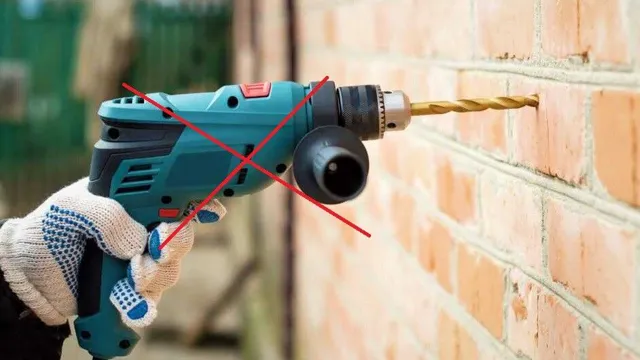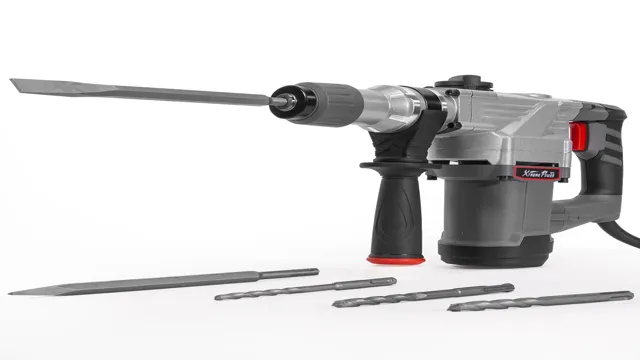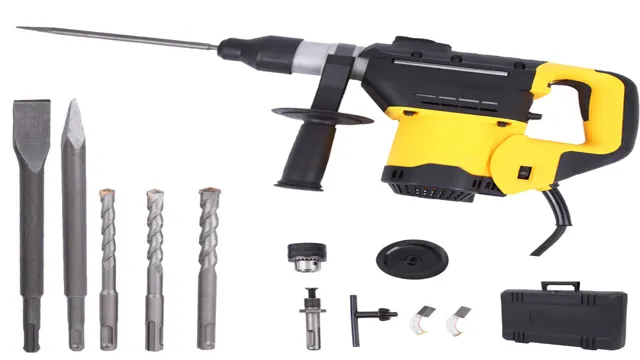Do I Need a Hammer Drill for Concrete? Find Out the Answer Here!

If you’re looking to tackle a concrete project, one question that may come to mind is whether or not you need a hammer drill. The answer is, it depends. If you’re just hanging pictures or shelves, a regular drill may suffice.
However, if you’re drilling into thicker concrete or masonry, a hammer drill may be necessary. Think of it like trying to break a piece of candy in half with your bare hands versus using a hammer – the hammer will be much more effective. In this blog post, we’ll explore the different types of drills and when a hammer drill is necessary for concrete projects.
So, let’s dive in!
Understanding Concrete
If you’re planning on drilling into concrete, then the short answer is yes – you do need a hammer drill. Concrete is an extremely tough material, and without a hammer drill, you’re going to have a hard time making any progress. While a regular drill might be able to handle softer materials like wood or drywall, it simply doesn’t have the power or the speed to make an impact on concrete.
A hammer drill, on the other hand, uses a combination of rotary and percussive force to break through concrete and other tough materials. With its powerful hammering action, a hammer drill can make quick work of even the toughest concrete surfaces, giving you the precision and control you need to make the most of your project. So if you’re serious about drilling into concrete, make sure you have a hammer drill at your disposal.
Composition and Strength
Concrete is a versatile and reliable material that is used in the construction industry for its strength and durability. Understanding the composition of concrete is crucial in determining its strength and suitability for different projects. Concrete is made up of three basic components – cement, water, and aggregates (such as sand, gravel, or crushed stone).
The cement acts as the binding agent, while the water and aggregates help to create the desired consistency and strength. The ratio of these components and the curing process can significantly impact the strength of the finished product. It’s a bit like baking a cake – the right ingredients and process can result in a strong, reliable structure, while a lack of attention can result in a weak and brittle end product.
This is why it’s important to work with experienced and knowledgeable professionals when it comes to construction projects involving concrete. Want to learn more about concrete and its various applications? Keep following our blog for more expert insights!

Porosity and Density
Concrete is a versatile material that has proven to be essential in many construction projects due to its durability and strength. However, a vital aspect of concrete that is often overlooked is its porosity and density. Simply put, porosity refers to the level of open space within the concrete, while density refers to its mass per unit volume.
Understanding these properties is crucial, as they can impact the concrete’s strength, permeability, and overall durability. A high porosity level indicates that the concrete has more open space, which can lead to a weaker structure and make it more vulnerable to water absorption. On the other hand, a more compact concrete with less porosity will have a higher density and be more resistant to water and corrosion.
When designing and using concrete in construction projects, taking into account its porosity and density can play a significant role in ensuring its longevity and performance.
Types of Drills
If you’re working with concrete, you may be wondering if you need a hammer drill. The short answer is yes, if you’re looking to drill into harder types of concrete. A hammer drill uses a special mechanism that allows it to hammer as it rotates, creating a chiseling effect that helps break up tough materials like concrete.
Without this feature, a regular drill may struggle to penetrate and make clean holes in high density concrete, resulting in a long and frustrating process. However, if you’re only dealing with softer types of concrete, such as those found in most home projects, a regular drill may suffice. It’s important to consider the type of concrete you’re working with before investing in a hammer drill, but in general, it’s a valuable tool to have in your arsenal for tough drilling projects.
Standard Drill
When it comes to drilling, there are several types of standard drills depending on the job at hand. These drills range from more common handheld drills to larger stationary models depending on the task and type of workpiece. Handheld drills are perfect for small home repair jobs where precision and mobility are important, while larger models are better suited for construction work and other heavy-duty tasks.
Twist drills are a common type of drill bit used in both handheld and stationary drills. They feature a spiral design that helps to cut into the material and remove debris from the hole. Step drills are another popular type of bit favored for drilling in soft metals like copper and brass.
For tougher materials like steel, cobalt drills are the best choice because of their heat resistance and durability. Keeping these various types of drills in mind when selecting the right tool for the job can make all the difference in the success of any project.
Hammer Drill
A hammer drill is a type of power tool that is specially designed for drilling hard surfaces like concrete, brick, and masonry. It is called a hammer drill because it comes with a built-in hammering action that provides the necessary force to penetrate tough materials. The drill bit moves back and forth along with a circular motion, creating a hammering effect that shatters the surface.
There are two main types of hammer drills – corded and cordless. Corded drills are typically more powerful and reliable, but they have limited portability. Cordless drills, on the other hand, are more versatile as they allow for greater freedom of movement, but they may not always be powerful enough for larger jobs.
When it comes to buying a hammer drill, you should consider the type of work you’ll be doing. If you plan on using it for DIY projects or small jobs around the house, a cordless drill should suffice. However, if you work in construction or plan on tackling larger projects, you may need a more powerful corded drill.
Other factors to consider include the chuck size, the power rating, and the speed of the drill. A larger chuck size can accommodate larger drill bits, while a higher power rating allows for more torque and speed. Additionally, variable speed settings can provide greater precision and control over your drilling.
In conclusion, a hammer drill is an essential tool for anyone who works with hard surfaces. Understanding the different types and features available can help you choose the right drill for your needs. Whether you opt for a corded or cordless drill, be sure to choose a high-quality, reliable model that is built to last.
When to Use a Hammer Drill
If you’re planning to drill into concrete, you may be wondering if you need a hammer drill. The answer depends on what type of drill bit you’re using and how hard the concrete is. If you’re using a standard drill bit, a regular drill should suffice for softer concrete.
However, if the concrete is hard or if you’re using a masonry bit, a hammer drill may be necessary. A hammer drill uses a pulsing action to break up the concrete, which can prevent the drill bit from becoming damaged and help you drill more quickly and efficiently. So, while it’s not always necessary to use a hammer drill for concrete, it’s certainly a good idea if you’re dealing with tough materials.
Thickness and Density of Concrete
When it comes to concrete drilling, it’s important to know when to use a hammer drill. Hammer drills are perfect for drilling into concrete because they deliver a powerful percussion force to break through dense concrete surfaces. However, not all concrete surfaces require the use of a hammer drill.
For thinner and less dense concrete surfaces, such as those commonly found in residential settings, a regular drill will suffice. When dealing with thicker and more dense concrete, such as those found in commercial or industrial settings, a hammer drill will make the process much quicker and more efficient. It’s important to choose the right tool for the job to avoid frustration and potential damage to your tools.
By understanding the thickness and density of the concrete you’re dealing with, you can make an informed decision on whether to use a hammer drill or a regular drill. Remember, a hammer drill is a powerful tool that should be used with caution and safety measures should always be taken when operating it.
Type of Hole and Fastener
When it comes to creating holes for fasteners, it’s important to choose the right tool for the job. Hammer drills are specifically designed for drilling into hard materials like concrete and brick. They use a pounding motion in addition to the rotation of the drill bit to break up the tough surface for easier drilling.
When you are using a large anchor or screw on a masonry wall, a hammer drill is a must-have tool to get the job done quickly and efficiently. If you try to use a regular drill, you might damage the drill bit or fail to securely fasten the object to the wall. So remember, when you need to drill into tough materials, grab your trusty hammer drill and get to work!
Benefits of Using a Hammer Drill for Concrete
If you’re planning on drilling into concrete, it’s essential to use the right tool for the job. While a standard drill may be suitable for softer materials like wood or drywall, a hammer drill is necessary when it comes to drilling into concrete. But do you need a hammer drill for concrete? The answer is yes.
Hammer drills are specifically designed with a hammering mechanism that allows them to break through tough materials like concrete and masonry. They also have a higher drilling speed and power than regular drills, making them more efficient and effective for concrete-related projects. Plus, using a hammer drill can save you time, effort, and money by avoiding the need for costly repairs or replacements due to using the wrong tool for the job.
So, if you’re planning to tackle some serious concrete drilling, investing in a hammer drill will be well worth it in the end.
Efficiency and Time-Savings
Using a hammer drill for concrete can bring a ton of benefits, particularly when it comes to efficiency and time-savings. When it comes to construction projects, time is money, and using a hammer drill can help you get the job done much faster. The hammer drill’s ability to drill and hammer simultaneously means that it can penetrate hard materials like concrete much more efficiently than a regular drill.
In addition, it also eliminates the need for manual sledgehammering, which can be time-consuming and physically exhausting. Think of it like this: using a regular drill on concrete is like using a knife to cut through a thick piece of steak. It’s doable, but it takes a lot of effort and time.
Whereas using a hammer drill is like using a steak knife to cut through that same piece of steak- it cuts through it like butter and saves you time and effort. If you’re looking to increase your productivity and efficiency on your next construction project, using a hammer drill for concrete is a no-brainer.
Safety Considerations
When it comes to drilling into concrete, a hammer drill can be a game-changer. Not only does it make the job faster and more efficient, but it also offers numerous benefits over traditional drills. For starters, hammer drills are specifically designed for drilling into tough materials like concrete, brick, and stone.
This means you’ll be able to make quicker progress with less effort. Additionally, hammer drills offer an impact mechanism that helps to break up the concrete as you drill, reducing the chances of the drill bit getting stuck or breaking mid-way. This keeps you safer while working, as well as saves you time and money on costly drill bits.
Lastly, many hammer drills offer adjustable settings, allowing you to control the depth, direction, and speed of your drilling for precise results. All in all, a hammer drill is an ideal tool for any concrete drilling job, offering a whole host of benefits that can’t be beaten.
Conclusion
In summary, if you’re trying to drill into concrete without a hammer drill, you might as well be trying to cut a steak with a spoon. It’s possible, but it’ll take forever and won’t be pretty. Invest in a good hammer drill and save yourself time and frustration.
Plus, you’ll have a handy tool for any future DIY projects that require heavy-duty drilling. Say goodbye to the spoon and hello to the hammer drill!”
FAQs
What is a hammer drill and how does it work?
A hammer drill is a powerful tool used for drilling through hard surfaces like concrete. It works by using a hammering mechanism to apply force while drilling, making it easier to break through tough materials.
Can I use a regular drill to drill through concrete?
While it’s possible to use a regular drill to drill through concrete, it’s not recommended. Concrete is a very hard material and requires a lot of force to drill through. A hammer drill is specifically designed for this purpose and will make the job much easier.
What is the difference between a hammer drill and a regular drill?
The main difference between a hammer drill and a regular drill is that a hammer drill has a hammering mechanism that helps to break through hard surfaces like concrete. Regular drills do not have this feature and are better suited for softer materials like wood and plastic.
How do I choose the right size hammer drill for my concrete project?
The size of the hammer drill you need will depend on the size of the holes you need to drill. For smaller holes, a lighter and more compact hammer drill will be sufficient. For larger holes, a heavier and more powerful model may be necessary.
Can I rent a hammer drill instead of buying one?
Yes, many hardware stores and tool rental companies offer hammer drills for rent. This can be a good option if you only need to use the tool for a short period of time and don’t want to invest in purchasing one.
What safety precautions should I take when using a hammer drill?
When using a hammer drill, it’s important to wear eye protection, ear protection, and gloves. You should also make sure the drill is properly grounded and never use it in wet conditions. Always read the manufacturer’s instructions and follow recommended safety guidelines.
Can a hammer drill be used for other types of projects besides concrete?
Yes, a hammer drill can be used for other types of projects like drilling through stone and masonry. However, it’s important to make sure you’re using the correct type of drill bit for the material you’re drilling through.



